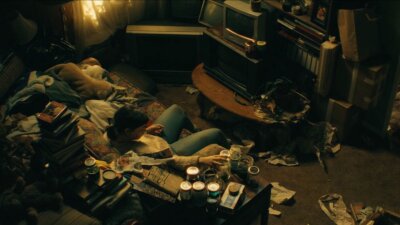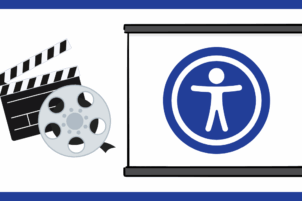
Courtesy of Sundance Institute | photo by Daeil Kim.
Writer/Director Joanna Fernandez’s short film “The Things We Keep” examines the impact of Alzheimer’s and OCD through the genre of horror, allowing viewers to learn how both Alzheimer’s and OCD affect not only the individual, but their family members as well. Fernandez creates a powerful narrative while using both horror and magical realism as a lens to showcase an allegorical tale of caregiving and intergenerational trauma between a mother and daughter.
In “The Things We Keep,” Kate (Rebecca Holopter) returns home to take care of her estranged mother (Jenny O’Hara), a lifetime hoarder. Hoarding is a form of obsessive-compulsive disorder that is categorized by severe emotional attachment to inanimate objects. As hoarders accumulate more items, they often become more isolated from family and friends. Furthermore, the idea of cleaning out hoarded items leads to panic.
“As someone who has struggled with OCD and anxiety, I know firsthand how the mind can play tricks on us and the devastating impact mental illness can have on our lives and those around us,” Fernandez said in a director’s statement on Film Freeway. “‘The Things We Keep’ is a personal exploration of these themes, drawing on my own experiences and those of others affected by mental illness. Through horror, I hope to shed light on the often-misunderstood world of OCD and compulsions and the games our minds play on us.”
In “The Things We Keep,” Kate believes that her mother is hostile due to her Alzheimer’s. However, she soon learns that her mother’s hoarding and warnings to not clean the house was self-preservation.
Fernandez shared that the film is based on her relationship with her mother, who has early-onset Alzheimer’s as well as CTE, a condition that many football players who had repeated head injuries that results in impulsivity, explosivity, and aggression. This was due to abuse her mother suffered from her own mother.
“Sometimes watching her deteriorate, it feels like I am trapped in a horror movie,” Fernandez said in an interview with Sundance. “When I turn to my mom, I never know who I am getting. I don’t know if I’m getting a hostile stranger or my sweet mom… The abuse that plagued me as a child was a direct result of the trauma my mom had endured. The idea that we are destined to become our parents is terrifying, but I refuse to let that happen. I feel a huge responsibility to give my mom the empathy and care she never received, and I’m determined to end the cycle of intergenerational trauma in my family.”
Fernandez wrote and directed this film for her MFA thesis at USC. This 15-minute film premiered at the 2025 Sundance Film Festival Sunday evening as part of the Midnight Short Film Program, which traditionally screens a curated selection of horror genre short films. In addition to screening in Park City and Salt Lake City, this film is available online. Some films in the Midnight short film program contain strobe effects.







